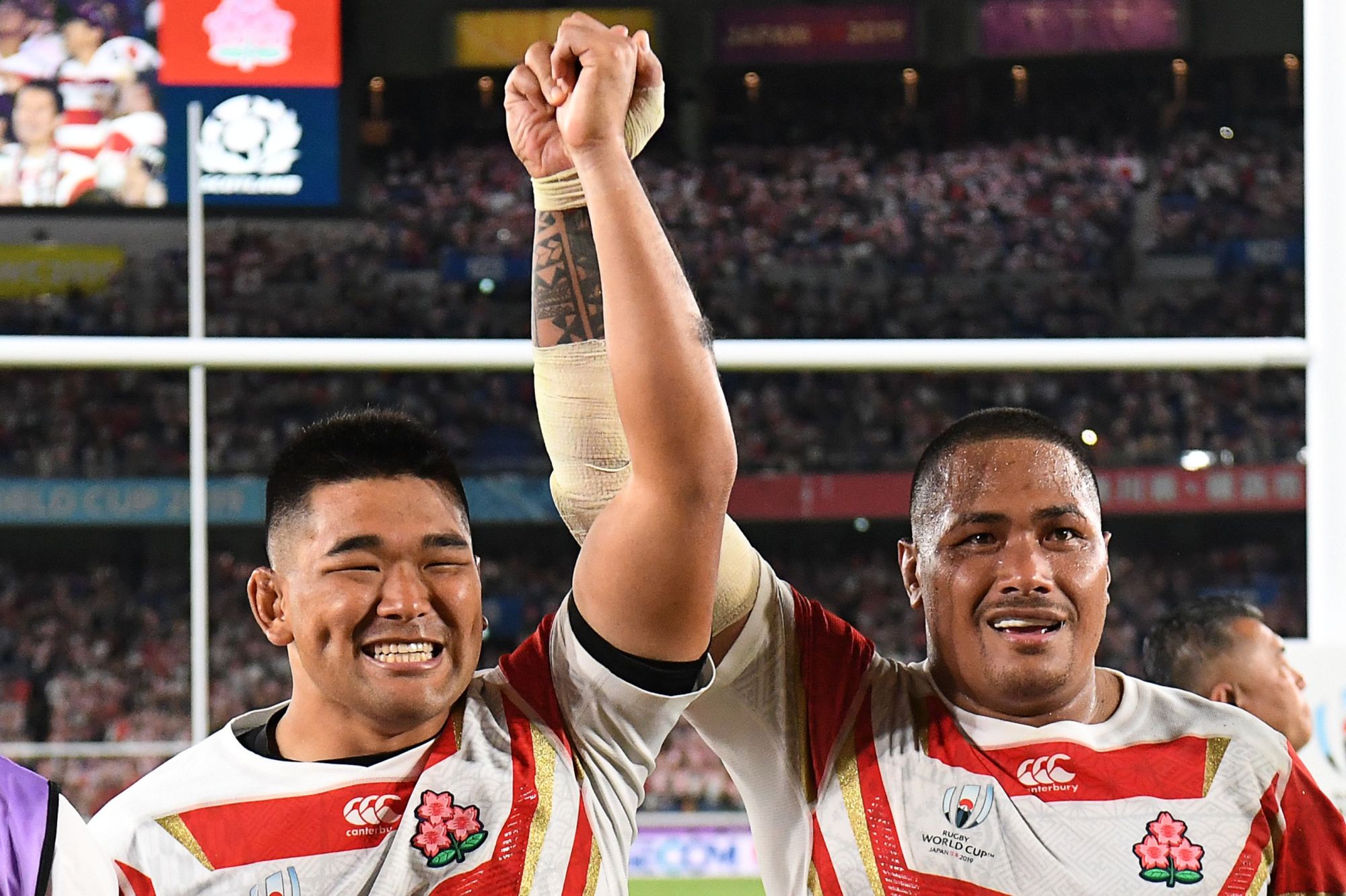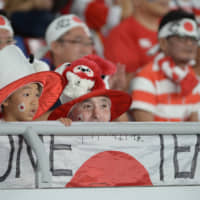The defining moment during Sunday's enthralling Rugby World Cup game between Japan and Scotland in Yokohama was not Kenki Fukuoka's superb second try. Nor was it any of the umpteen tackles put in by Luke Thompson or Ryoto Nakamura.
It came 21 minutes into a game that many are calling a classic, won 28-21 by the hosts, when Koo Ji Won was forced from the field.
The tighthead prop was in tears, his game done, but the response of the Japan bench was, to a man, to run to the touchline and give the 25-year-old Takushoku University graduate a consoling hug.
The Brave Blossoms describe themselves as "One Team" and their amazing run — which has seen them advance to the quarterfinals unbeaten and as winners of Pool A — has been a collective effort, one based on the Japanese work ethic and performed by an eclectic group devoted to playing and coaching for the land they live in.
If further proof was needed, almost as soon as Koo sat down among the replacements, the man who replaced him, Asaeli Ai Valu, helped Shota Horie and Keita Inagaki force Scotland to concede a scrum penalty.
And it did not end there for the front-row union, with Inagaki then finishing off a superb flowing move involving three offloads to go over for his first try in a test match.
"He just happened to be there," Japan technical chief Yuichiro Fujii said with a smile on his face Monday, before adding, "Inagaki has great skills and fitness. His role is to take the ball into contact, and his support play after that led to the try."

Great skills and fitness were at the core of Japan's win.
Scotland had no answer to the pace at which Japan played the game in the first half, 40 minutes of rugby in which the hosts had 74 percent of possession.
"They're very good at keeping hold of the ball, you saw that for the first half," said Scotland flanker Jamie Ritchie.
And when the Scots forwards started to get the upper hand in the second half, they came up against a resilient Japanese defense that fought to the bitter end.
"We have been to some dark places in preparation — pretty tough camps — and that is modern rugby," Thompson said of the physical and mental strengths of the Japan team. "You don't go out and do that stuff by accident, you have to earn it."
Fujii said great credit needed to go to head coach Jamie Joseph, who "has worked on the forwards' development for the last three years. His attention to thorough detail has really raised their skill level."
That detail involves changing the game plan depending on the opponents.
Against Samoa the plan was to kick, forcing the opposition to run it back and allowing Japan to make tackles, rather than be tackled by the physical Pacific islanders.
Against Scotland it was to run the opposition ragged.
Japan kicked just 10 times and ran for 559 meters as attack coach Tony Brown came up with a number of plays to confuse the Scots.
"Tony is a fabulous rugby coach, and together as a team we complement each other in terms of how we approach the players and what type of environment we create," said Joseph.
"A lot of that is to do with giving players the responsibility, giving them accountability around performance and trusting them really."
Joseph also praised forwards coach Shin Hasegawa, who has ensured the Japan pack can more than hold their own at the set-piece, while the work of Scott Hansen (defense) and Simon Jones (strength and conditioning) was very evident in all four pool games.
"I think the word attack is often reflected in when we have the ball, but we are an attacking team in defense as well," said Joseph.
"What is often talked about is where the tries came from, but what I remember is our really attacking defense line that created opportunities through turnovers that then created tries."
"Our game plan was to keep the ball as much as we possibly could to control the speed of the game. And trusting the plan is what saw us through. The players need to take the credit through trusting each other, trusting what we had trained for and planned. That was the difference in the end."
Not that that was always the case.
"I could take you back a couple of years and that wasn't quite right," said Joseph. "You've got to go through a bit of pain, and players have got to go through a bit of pain, but eventually it comes if you believe in what you are doing."
A point expanded on by Nakamura.
"I think our mentality has changed since Jamie became head coach," the center said. "We talk about it as a team and the coaches and leaders are pulling us together. It is really helping and changing us."
"Today's win is the result of the 31 Japan members, those who took part in the camps and those who competed in the 2015 tournament. We happen to be representing Japan and this is a result earned by all of Japan."
The Scots were certainly left impressed.
"They are a terrific side and have some quality individuals who play well collectively, and are a team built on confidence," said Scotland fullback Stuart Hogg.
"As soon as they get on the front foot they are incredibly hard to stop. Test rugby is a game of fine margins and they took their chances."
The nation of Japan will be hoping South Africa will be left as equally impressed and disappointed following Sunday's quarterfinal.





